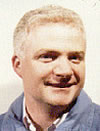Bellesi Manlio Via Garibaldi 57 0049-733434332 |
 |
I teach Physics in a Liceo Scientifico (liceoscientificomc@libero.it, which is a High School - akin to Gymnasium). Physics is taught on a five-year course basis, to students of age ranging from 14 to 18. Three periods a week – they allow a fair coverage of some among the most important topics of the subject: classical mechanics, equilibrium thermodynamics, classical electromagnetism, plus a smattering of ‘modern’ physics (including: special relativity, basic elements of quantum mechanics, structure and evolution of stars, classical cosmological models).
Anything else? I do like music and I’ve played guitar for a long time... What about your favourite tunes?
School webpage: http://space.tin.it/scuola/mddtre/
CURRICULUM VITAE:
--------------
Born in Macerata (Italy), 9/9/1961.
1979: Maturitr scientifica (Secondary school leaving examination. Vote
60/60).
1987: Physics degree (Vote 102/110 - University of Pisa). Thesis:
"A thermodynamic model for the formation of binary star systems".
1988: National Service (Italy and England).
1989-1992: Worked as "specialist" for the Societr Generale Informatica
(SOGEI), based in Rome, on a project commissioned by the Italian Ministry
of Finance, dealing with the development of software for the automated
control of cadastral maps of Italian territory. Procedures were written
in Fortran VAX.
From 1992 onwards: Having passed the National examinations (Math and
Physics in Secondary school), starts a new career as teacher in Macerata,
Italy. Present school address: Liceo Scientifico "Galilei".
Teaches within
the framework of the PNI - Piano Nazionale per l'Informatica (National
Plan for Computer Science). This project emphasizes the role of Math
and Physics (also supported by a proper and critical use of computers
in class), both in time (three extra periods a week) as well as in the
number of topics treated. PNI possibly stands as the best opportunity
to
teach modern physics in some detail on a secondary school level in Italy.
OTHER ACTIVITIES:
1995-1997: worked (3 one-year contracts) as tutor for Calculus students
of the Electronical Engineering Department, University of Ancona, Italy;
1996-2000: worked (4 one-year contracts) as tutor for General Maths
students of the Economics Department, University of Macerata, Italy;
1997-1998: worked (2 one-year contracts) as assistant professor of
General Geography (module: Astronomy) for the Nature Sciences Department,
University of Camerino, Italy;
1999-2000: attended a post-graduate annual course (Matematica gestionale
e Modellistica Matematica -Mathematics of Management and Mathematical
Modelling in Economics) at the University of Camerino, Italy;
1999-2000: (on behalf of the Provveditorato agli Studi di Macerata) gave
a 60-hour physics course for Math and Physics (class A049) qualifying
examinations;
2000-2001; (on behalf of the Provveditorato agli Studi di Macerata)
gave a 40-hour physics course
for Physics (class A038) qualifying examinations;
2002: selected by the Istituto Nazionale di Fisica Nucleare (INFN),
takes part in the second event of POS - Physics On Stage, as an INFN
non-delegate.
During the last two years he got involved in some INFN initiatives
(Incontri di Fisica 2001 and 2002), in so establishing close connections
between his own school and the Physics National Laboratories based in
Frascati, Rome.
WHY SHOULD I ATTEND?
--------------
Notwithstanding my age, I have retained a deep interest in science,
especially physics, maths and astronomy. As a teacher, I have always
tried to give "life" to the topics I deal with, bringing to
the kids a
sparkle of the deep beauty of science's achievements and hopes as the
study of our Universe keeps on making progress.
I must confess that I have no certainties about the success of such
endeavours - just small clues now and then (for instance, a smart student
deciding to attend physics courses at the university). However, I am
convinced that the more I learn and understand, the more my students
will benefit from my knowledge. Popularizing science is a hard task,
and I need all the help available.
...If I have to be truly honest, the real reason why I'm sending my
application is because this programme is going to be a sort of cultural
shock, by learning from first-rate scientists, and it promises to be a
lot of fun! It would be great to be part of the crew.
HOW WILL I DISSEMINATE KNOWLEDGE?
--------------
Apart from my classroom and school, I am personally involved in some
initiatives tending to popularize in this area of Italy some major
outcomes of scientific research. The town I live in has a long-standing
tradition in culture, but only as far as humanities are concerned. In
order to balancing the scales, we have been organizing for the last
eight years several series of public talks and lectures, which take
place in public halls as well as primary and secondary schools of the
area. The lecturers (myself among them) are science teachers and –
on
occasion – some real researchers in the physics field, who come
on the
basis of a pre-existing acquaintance or friendship with us. Results of
such dissemination should considerably improve if one of the lecturers
acquires a new body of scientific knowledge.
HOW DID I LEARN ABOUT HST?
--------------
It all started in Frascati, where our friends of the Istituto Nazionale
di
Fisica Nucleare told us about CERN’s initiatives for high school
teachers.